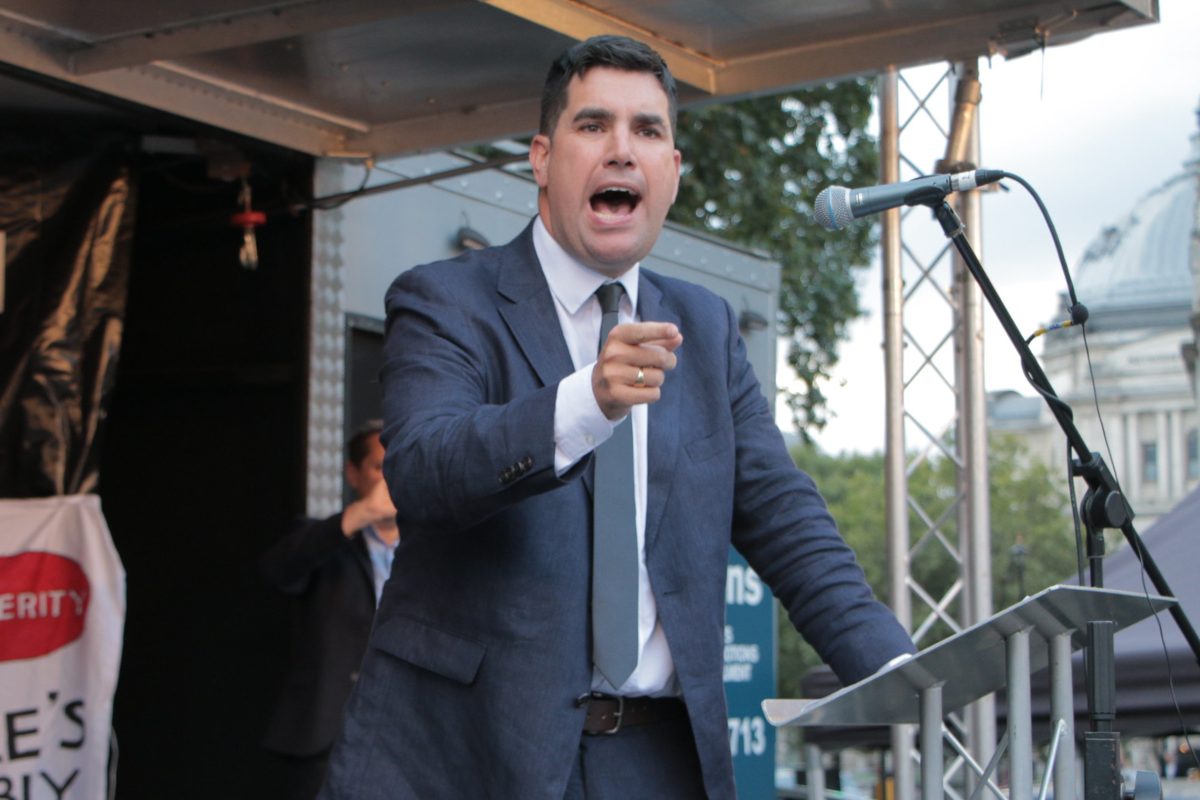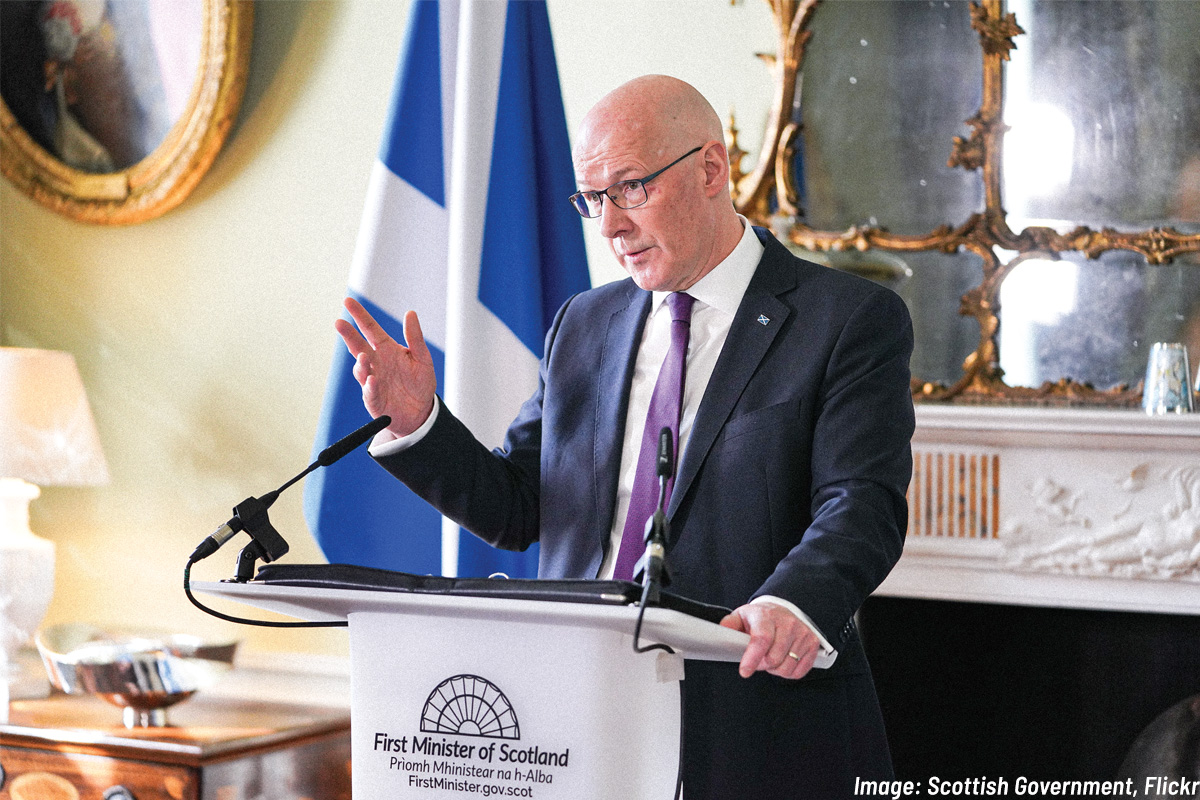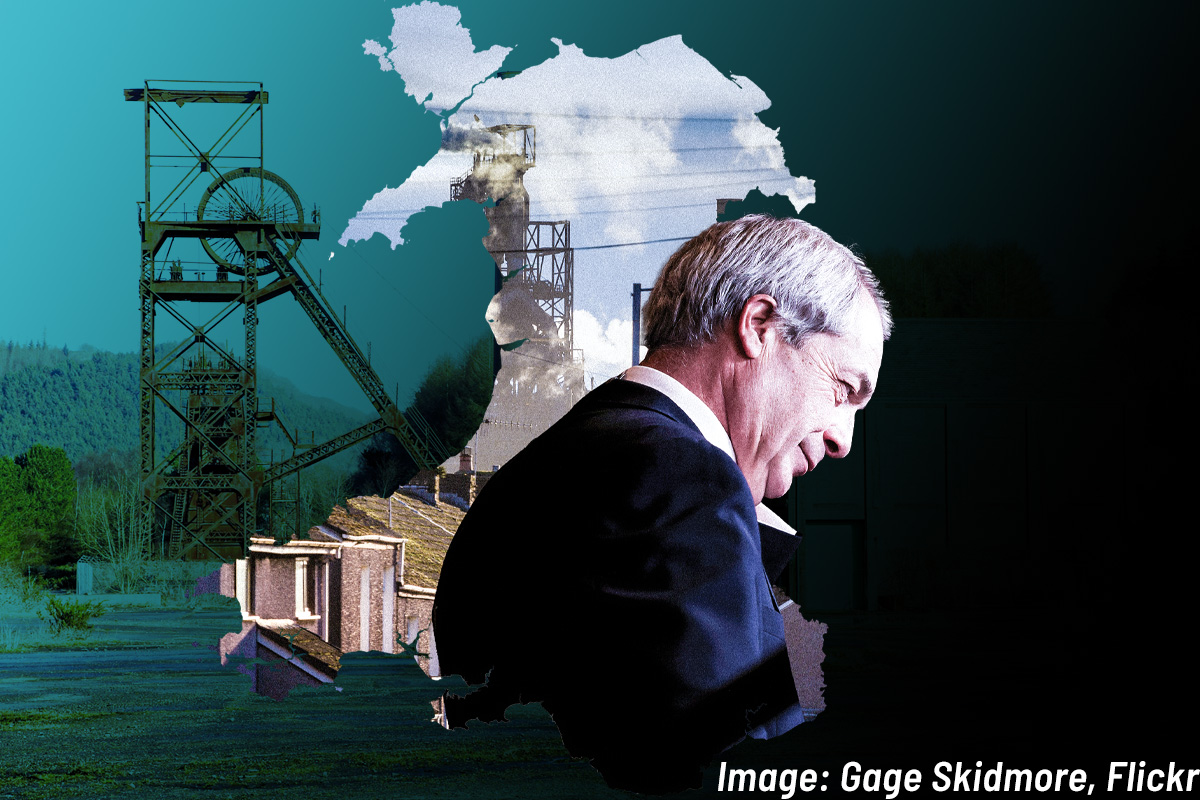Left-wing MP Richard Burgon recently outlined a 10-point policy proposal to galvanise the left. But the Keynesian ideas put forward are not enough. We need to mobilise workers and youth around bold socialist demands.
In a recent article for Tribune, Richard Burgon – MP for Leeds East and secretary of the Socialist Campaign Group of MPs – lays out a 10-point programme for the Labour left to rally around.
In the spirit of comradely debate, we discuss here Richard’s proposals, and outline the genuine socialist alternative needed to solve the problems facing workers and youth.
Keynesianism
 We agree with Burgon that the coronavirus pandemic has “laid bare the deep failings in our society caused by a decade of austerity”.
We agree with Burgon that the coronavirus pandemic has “laid bare the deep failings in our society caused by a decade of austerity”.
The left-wing MP is also correct to state that a “distorted economy, weak public services, broken social care system, woeful lack of workers’ rights and hollowed-out social security system have left us less dangerously unprepared to deal with this crisis.”
But this is not the end of the question. Austerity was the ruling class’ response to an organic crisis of capitalism, which is ultimately what lay behind the 2008 crash. Nothing has been resolved since then.
The coronavirus did not cause the economic and social collapse we are experiencing – it merely gave a decaying system the shove it needed to come tumbling down.
So what sort of programme is required to deal with this “new normal?”
Most of Burgon’s proposals amount to Keynesianism: government borrowing and spending to stimulate demand and create growth.
But as we have explained in greater length elsewhere, Keynesian policies don’t get around the problem of having to pay for additional state expenditure – whether this be through taxation, austerity, or borrowing.
All of these ultimately have consequences in terms of depressing investment and demand, or creating inflation and instability. In short, there is no such thing as a free lunch under capitalism.
State spending also doesn’t create any new value, which under capitalism comes from the exploitation of the working class, for profit. And in a system in which the means of production are privately owned, the capitalists won’t invest in jobs, infrastructure, and social services unless there are profits to be made.
In short, these ideas attempt to manage the ‘worst excesses’ of capitalism without breaking from it. But these excesses are the rule, not the exception. Crisis, unemployment and inequality are hardwired into the system.
The only way to meet the needs of workers and youth today – in Britain and internationally – is through clear socialist measures; policies that place the wealth and economic resources of society under public ownership, workers’ control, and democratic management, so they can be put to use on the basis of needs, not profits.
Unemployment
 For example, Burgon correctly points out that Britain is facing catastrophic levels of unemployment following the COVID-19 pandemic. And things will only get worse when the Tories cut the furlough scheme, which is currently keeping nine million workers afloat. Up to 15 percent of the workforce faces the scrapheap in coming months.
For example, Burgon correctly points out that Britain is facing catastrophic levels of unemployment following the COVID-19 pandemic. And things will only get worse when the Tories cut the furlough scheme, which is currently keeping nine million workers afloat. Up to 15 percent of the workforce faces the scrapheap in coming months.
In response, Burgon suggests a “national campaign for jobs that both supports trade unions in defending every job and outlines the urgent need for the government to step in and directly create employment opportunities.”
In tandem with this, he proposes “a programme of public works that gets people into well-paid, skilled, secure employment that serves society’s needs”.
We fully support the idea of Labour throwing its weight behind unionised workers to defend every job. However, while the Tories have temporarily embraced state spending to keep workers afloat and avert total social collapse, they aren’t about to pay for a massive programme of job creation. On the contrary, they are letting thousands of jobs go under, and are preparing a bill for the working class to pay for the measures they have taken.
This is because the Tories are the political representatives of capitalism, which is in a deep crisis. Even before the coronavirus pandemic, the government was up to its ears in debt. And the capitalists were trying to shed excess capacity by cutting jobs and mothballing industries, because the market could not absorb their commodities profitably. The fact that the Tories allowed British steel to collapse last year provides evidence of this.
Burgon’s suggestion of employing people to rebuild public services decimated by COVID-19 meets the same obstacle: who will pay?
The capitalists cannot directly exploit public services for profit. And the Tories can’t spend what they don’t have. So the cash will either come from tax (more on that later) or printing money (creating inflation).
We cannot appeal to the bosses’ better nature. Nor can we wait for the Tories to spend their way out of this nightmare. Instead, the Labour left should demand that all necessary work be shared across the workforce, without any loss of pay.
Any boss who says they can’t afford this should be made to open up their books to the labour movement for inspection. If they refuse, their companies should be seized by the state and managed under workers’ control.
The demand for full employment should be taken up. But this is only possible on the basis of public ownership and democratic management of the economy, run for need – not tinkering with a system based on private ownership and production for profit.
Climate change
 Similarly, Burgon calls for a Green New Deal: creating over a million green jobs, coupled with investment in renewables, public transport and infrastructure, and retrofitting of homes. He correctly states that “the market clearly cannot meet this challenge”.
Similarly, Burgon calls for a Green New Deal: creating over a million green jobs, coupled with investment in renewables, public transport and infrastructure, and retrofitting of homes. He correctly states that “the market clearly cannot meet this challenge”.
It is no accident that the capitalists have not invested in sustainable technologies up until now, despite various state measures to incentivise them: they are simply not profitable.
For instance, once installed, renewable energy infrastructure is essentially free, and cuts off the fossil fuel monopolies from their super profits. Of course, this wouldn’t matter under socialism.
But even if a shift towards green production and infrastructure were to occur on a capitalist basis, the bosses from polluting sectors would simply pass on the losses to their workers in the form of pay cuts and unemployment.
Rather than drawing the conclusion that we must break from the market, Burgon says the state should “bail out people and the planet”. He doesn’t elaborate further.
But previous proposals for a Green New Deal have been Keynesian: effectively arguing that the government should manage capitalism, and stimulate demand by investing in green technologies and renewables. This falls well short of what is needed.
Today, just a handful of big companies are responsible for over 70 percent of greenhouse gas emissions, in addition to about 90 percent of global landfill. In order to put a stop to their reckless practices, a socialist government would nationalise these parasites and place them under workers’ control so production could be planned in harmony with the planet.
As part of the Lucas Plan in the 1970s, workers in the military and aerospace industry developed proposals for redeploying their workplaces to produce medical equipment and renewables. This offers a blueprint for how a radical left government could carry out a massive green transition without eliminating millions of jobs.
Unfortunately, Burgon’s vague Green New Deal sounds like a step back even from Labour’s 2019 manifesto pledge for a Green Industrial Revolution. At least this highlighted that climate change is a class issue, and put mass nationalisation of energy networks at the forefront.
Income
In light of hundreds of thousands of people being forced to claim means-tested benefits for the first time, Burgon calls for a “progressive, social security system based upon universalism and a Minimum Income Guarantee”. Again, he’s quite vague. But this sounds a lot like Universal Basic Income: another popular proposal on the Labour left.
The idea of giving everyone in Britain a basic income to survive sounds progressive on the surface. But it’s no surprise that billionaire right-wing libertarians like Mark Zuckerberg are on board with the idea.
These capitalists hope that this measure could allow millions of unemployed or underemployed people to have barely enough to keep consuming, and thus keep the system going. Any money that ordinary people did receive from a UBI, meanwhile, would still ultimately flow back into the pockets of the bosses, bankers, and landlords in the form of profits, rents, and interest.
And besides, why should millions of people be content with the bare minimum to survive, while the fatcats keep their fortunes?
There is ample money in the system to provide a living wage to everyone in society. In Britain, £700bn of uninvested capital and accumulated profits are lying uselessly in the accounts of the biggest corporations. This is more-than-double the amount paid out in business loans through Rishi Sunak’s “New Deal”.
Under a socialist economic plan, this idle money could be requisitioned without having to be paid back, and used to create decent jobs with decent wages for all.
Rather than offering a meagre ‘basic’ income, the labour movement should be fighting for universal quality services: for homes, healthcare, transport and public services – all freely available to everyone. And the money for this should come from expropriating the capitalists.
Nobody should have to face the uncertainty of unemployment or the degrading humiliation of the benefits system. Instead, we need to plan the economic along socialist lines, to put an end to joblessness, homelessness, and poverty altogether.
Nationalisation
 We fully agree with Burgon’s proposals to repeal the 2012 Health and Social Care Act, eliminate privatisation from the NHS and protect it from any trade negotiations with the USA – as well as paying health workers decent salaries “worthy of the vital work they do”.
We fully agree with Burgon’s proposals to repeal the 2012 Health and Social Care Act, eliminate privatisation from the NHS and protect it from any trade negotiations with the USA – as well as paying health workers decent salaries “worthy of the vital work they do”.
We also agree with his call for free education and a “nationally-coordinated campaign for proper Local Authority funding”. This would be a huge step forward compared to the cuts and outsourcing that currently decimate local services.
However, his “Alternative Economic Plan” is a clear continuation of Corbynomics – including its limitations.
Burgon talks about “state-led investment through state banks to create skilled employment, improvements in living standards and the high-skill industries of the future as well as tackling both our economy’s substantial productivity gap and unacceptable regional inequalities.”
Much like Labour’s 2017 election manifesto, he calls for a “more managed economy [in which] the railways, mail, water, energy and fibre broadband provision must be brought into public ownership with greater democratic control. We must also fight for (part) ownership of those strategic companies that receive state bailouts so that the rewards go to public, not private shareholders.”
In other words, the proposal is to establish state banks to fund public works alongside a private banking sector. In this scenario, the capitalists would maintain their power to sabotage the economy by conducting a ‘strike of capital’ and refusing to invest.
A socialist government, by contrast, would create a single, state-managed bank, under the democratic control of the organised working class. This would exist to channel economic resources towards the projects that society – not big business – deemed most urgent and necessary.
Moreover, note the half-measures in Burgon’s language: a “more managed economy… greater democratic control…part ownership of those strategic companies that receive state bailouts.”
Particularly in the latter case, why should bosses who run their companies into the ground and seek bailouts be allowed to retain control over these assets? Instead, these big businesses should simply be nationalised, without compensation.
Burgon is not advocating a socialist economy managed by the working class, but a mixed economy with a bit more state oversight. But capitalism operates on the basis of production for profit, according to the anarchic laws of the ‘invisible hand’. And so state control within a market economy merely stifles investment, because it limits the capitalists’ ability to make profits.
The left-wing Labour MP is right to propose further nationalisation. But we would go a lot further, targeting the commanding heights of the economy – the big banks, industries, businesses and hedge funds – so that these can be geared towards the fulfillment of human need.
These would not be bureaucratic, top-down nationalisations like those carried out by postwar Labour governments, in which workers had no direct say over the running of their industries. In this past model, nationalised industries were ultimately mismanaged by state bureaucrats, with any gains continuing to fall to the capitalists.
Neither would we propose simply putting a few workers on company boards, as ex-shadow chancellor John McDonnell previously promised.
Instead, we advocate for genuine workers’ control, in which workplace committees – elected by and accountable to the workers themselves – are in charge. These would then be linked up nationally by a workers’ state, and run according to a national plan of production, so that the entire working class is given a say over the running of the economy and society.
In short, we don’t want limited nationalisations and more democratic control – we want genuine nationalisations, proper workers’ control, and a socialist plan of the economy. Because you can’t plan what you don’t control, and don’t control what you don’t own.
Housing
There is little to fault in Burgon’s proposals to increase the national minimum wage to real living wage levels, ban zero-hours contracts, and repeal anti-trade-union legislation to enhance workers’ rights.
However, his call to bring the UK “into line with International Labour Organisation standards” is disquieting, given that the ILO is a UN agency in which labour bureaucrats and bosses’ representatives mutually determine how best to manage workforces in their respective countries. It is basically the ‘good cop’ to the IMF’s ‘bad cop’, and can’t be trusted to set standards for workers in Britain or anywhere else.
Instead of trusting imperialist institutions, workers themselves should set the standards for their own rights, terms and conditions.
We also support Burgon’s call to restore Labour’s policy of rent suspensions during the COVID-19 crisis – which has been watered down to rent “deferment” under Keir Starmer – in addition to enforcing eviction bans. However, he states that this should be accomplished through “state action”, implying the costs will be paid with public money.
One month today the eviction ban ends – leaving thousands of renters at risk.
The Government must not allow people to be thrown out of their homes during a pandemic.
The eviction ban must be extended alongside rent cancellations for tenants affected by the coronavirus crisis.
— Richard Burgon MP (@RichardBurgon) July 23, 2020
Why not simply expropriate the big landlords instead? After all, these vampires drain over half the monthly income of the majority of ordinary renters; and they have no qualms about putting workers out on the street due to the pandemic. Such a basic necessity as housing should be determined by needs rather than profits.
As a halfway measure, Burgon could even take up the call from the labour movement in the 1970s and 80s for rent to be capped at 5 percent of income.
Similarly, we agree with Burgon’s call for the housing crisis to be ended with the construction of 100,000 new council houses a year. But again, who pays?
Rather than financing this policy through borrowing or printing money, a socialist government would requisition thousands of empty homes, currently being held by their landlords as simple speculative investments.
Additionally, we would expropriate the banks, big property developers, and major construction companies, in order to plan a vast programme of quality social housing, eradicating homelessness.
Given the deep resentment over the cost and availability of housing, such a programme would have wide public support.
Tax
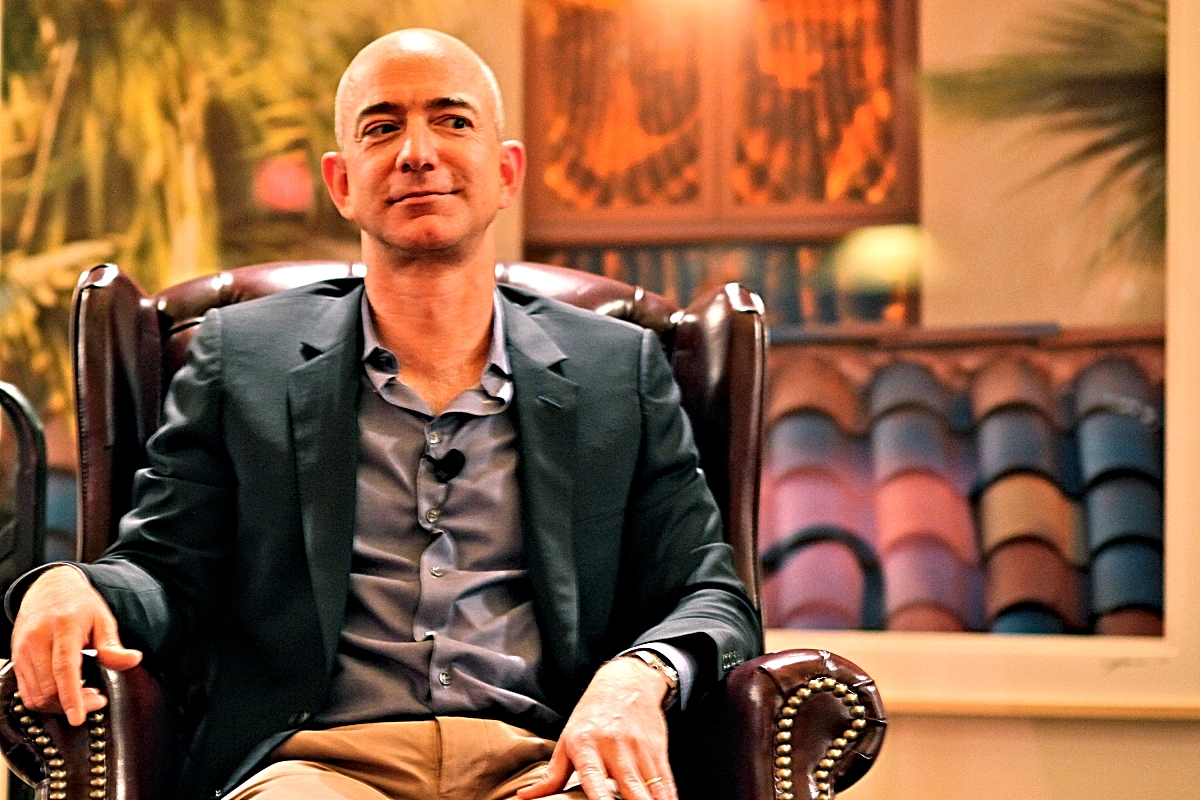 Burgon rightly draws out the galling situation exposed by the pandemic, in which millions face unemployment and homelessness, while the likes of Jeff Bezos can make $13 billion in a single day. However, his solution to this injustice (and to financing much of his programme) is increasing the tax burden on the wealthy.
Burgon rightly draws out the galling situation exposed by the pandemic, in which millions face unemployment and homelessness, while the likes of Jeff Bezos can make $13 billion in a single day. However, his solution to this injustice (and to financing much of his programme) is increasing the tax burden on the wealthy.
Indeed, the extent to which the rich avoid ‘paying their fair share’ is staggering. The public sector union PCS estimates that over £120bn is avoided, evaded, and uncollected every year – the vast majority of this by large companies.
It is also true that big corporations have lobbied the British government for more and more favourable tax rates to maximise their profits. Meanwhile, they continue to exploit loopholes, to the extent that Richard Branson’s Virgin healthcare group paid zero corporation tax after being given £2bn of NHS and local authority deals since 2010.
However, the reformist demand to ‘tax the rich’ overlooks the fact that the capitalists can always threaten to move their wealth and investment overseas to avoid the taxman. And they are not afraid to deploy this economic blackmail against a left Labour government, as was frequently threatened by the capitalists in response to the prospect of a Corbyn victory.
We say, why give them the chance to sabotage the economy? Let’s expropriate the rich and restore their wealth to the real wealth creators – the working class – so it can be used to meet the needs of people and the planet.
Racism
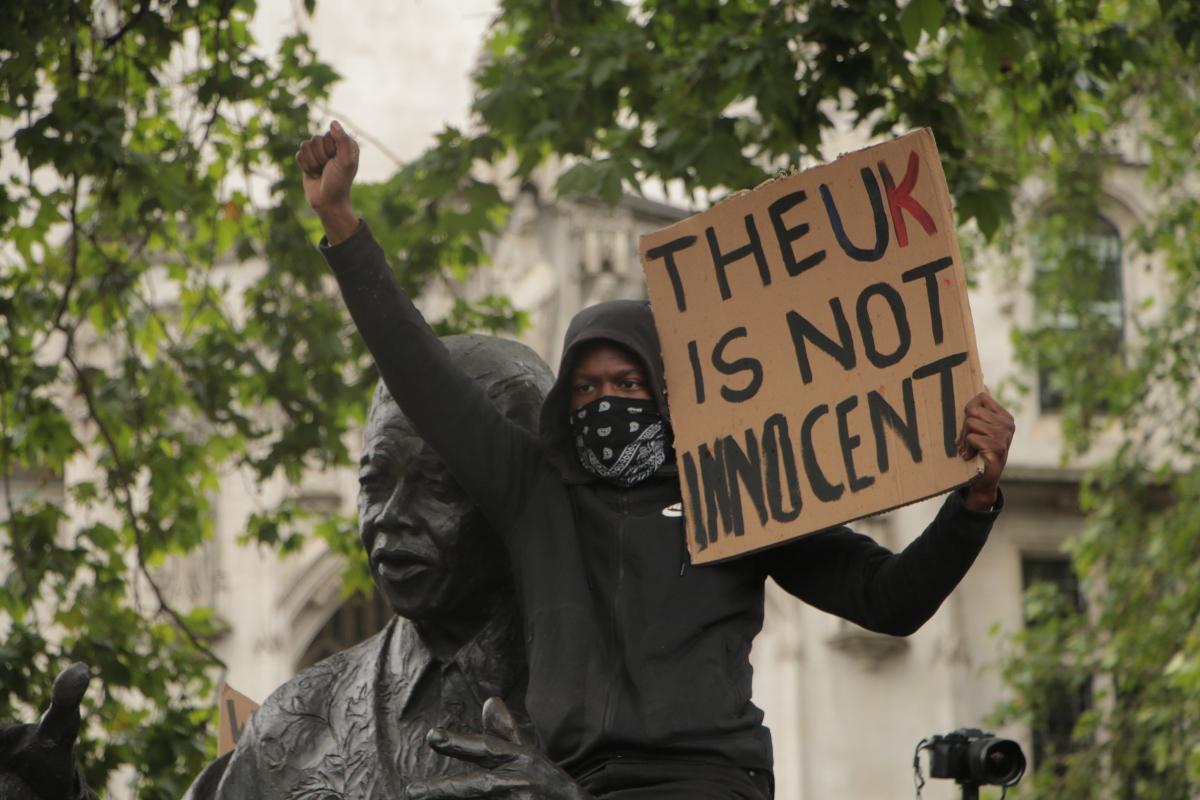 Keir Starmer’s response to the Black Lives Matter movement has been pathetic. The right-wing Labour leader, for example, has sided with the Tories in demanding 10-year jail sentences for vandalising statues of slave-owners.
Keir Starmer’s response to the Black Lives Matter movement has been pathetic. The right-wing Labour leader, for example, has sided with the Tories in demanding 10-year jail sentences for vandalising statues of slave-owners.
By contrast, encouragingly, Burgon calls for unequivocal solidarity with BLM and all anti-racist movements. He also correctly states that anti-racism “cannot be treated as a distraction from the class struggle, as some may argue, but be central to it by helping to build the unity of the working class in all its diversity that is needed to win the change we need.”
My video message of solidarity with the Leeds #BlackLivesMatter campaign, that has organised a socially distanced demonstration this afternoon. pic.twitter.com/UEy2gDtwxH
— Richard Burgon MP (@RichardBurgon) June 21, 2020
Linking class to the anti-racist struggle is essential. But we must also clearly state the reason for this. Capitalism is at the root of all forms of oppression: the bosses and the establishment need to pit workers against one another, in order to distract from their common enemy, and to facilitate their general exploitation.
We need workers to unite across all racial, sexual, national and gender lines in order to overthrow this rotten system. Capitalism is racist and repressive. And the capitalist state, with its brutal ‘armed bodies of men’, is a reflection of this fact.
Even under the left-wing leadership of Jeremy Corbyn, Labour was talking about putting more police on the streets in order to fight crime. This approach to the inherently oppressive capitalist state must be jettisoned.
Crime is a product of poverty and social decay under capitalism. This disproportionately affects people of colour, as Burgon himself acknowledges. But “the dismantling of systemic inequality” that he advocates necessitates the dismantling of the capitalist system itself.
Imperialism
 And finally, Burgon argues for a foreign policy based on “backing peace and justice, including justice for Palestine in the face of threatened further annexation and for an end to the war in Yemen, backing global calls for debt cancellation and campaigning for Britain to have an independent, ethical foreign policy.”
And finally, Burgon argues for a foreign policy based on “backing peace and justice, including justice for Palestine in the face of threatened further annexation and for an end to the war in Yemen, backing global calls for debt cancellation and campaigning for Britain to have an independent, ethical foreign policy.”
Burgon’s solidarity with oppressed nations is not in dispute. But the idea of a major capitalist, imperialist power developing an “independent ethical foreign policy” is unfortunate utopianism.
As Lenin pointed out in 1917: “No idea could be more erroneous or harmful than to separate foreign from home policy.” In other words, the foreign policy of capitalist nations is merely an extension of their policy at home; that is, a reflection of the political interests of the ruling class: their need to export their capital, conquer new markets, and exploit the working class.
Unless Britain breaks with capitalism, it will be bound hand-and-foot to the interests of imperialism, based on the exploitation and oppression of weaker nations by the strong.
The choice is stark, as Lenin further explains in response to the pacifist opponents of WWI: “All [their] pious wishes are doomed to remain hollow phrases, for capitalist reality puts the issue bluntly: either submit to the imperialists of one of the two groups, or wage a revolutionary struggle against all imperialists” [our emphasis].
A socialist government in Britain would soon find itself a pariah on the world stage, under attack from all sides by the forces of finance capital. In these circumstances, ‘independence’ would be neither possible nor desirable. Already, the inhabitants of Downing Street find themselves and their decisions on foreign policy dictated to by their counterparts in the White House.
Rather than an ‘independent’ foreign policy, a socialist Britain would require a revolutionary and internationalist one, calling on the working class of all nations to rise up against their own rotten regimes.
In this way, a socialist foreign policy, based on the principles of genuine internationalism and cooperation between workers’ states, would begin to take shape. This would be the only way to prevent a socialist government from being strangled from all sides by imperialism, and to truly assist oppressed peoples throughout the world.
Socialism
Burgon is a courageous and consistent left-winger, who ran an excellent grassroots campaign to be deputy Labour leader earlier this year, based on a principled defence of the legacy of the Corbyn movement.
As the leader of the SCG (Socialist Campaign Group), he has also been a staunch opponent of Labour’s rightward-shifts on workers’ rights, renters’ rights, and foreign policy; and he has refused to capitulate to the absurd smear campaign over the party’s supposed ‘institutional anti-semitism’.
We agree with Burgon that Labour’s 2019 general election defeat “was certainly not a rejection of [radical] policies”. And with the pandemic and COVID-19 crisis, millions of people are questioning the status quo like never before. They are desperate for answers. Desperate for an alternative. Rather than retreat to the centre, it is clear that the left should push forward even harder.
We are therefore encouraged that Burgon is using his position to develop a set of ideas to inspire and unify the left of the party. Many activists are still reeling from the impact of the 2019 general election, as well as Starmer’s victory in the leadership election.
The left-wing proposals being made by figures such as Burgon make a welcome change from the total dearth of ideas coming from Labour’s new right-wing leadership. But this programme does not go far enough. It isn’t noticeably more radical than, say, the 2017 Labour manifesto. In some places, it even takes a few steps backwards.
Capitalism’s deepest-ever crisis warrants the most radical programme in the party’s history: one based on the ownership and control of the key levers of the economy by working people.
This is the only alternative to a tidal wave of unemployment, poverty and misery, as the capitalists and their political cronies look to force the impact of the pandemic onto the shoulders of the working class.
The left must not wince or backtrack in the face of this historic juncture, but must boldly make the case for socialism. That is the only way to mobilise workers and youth against the Tories and their rotten system. There has never been a more urgent task.

